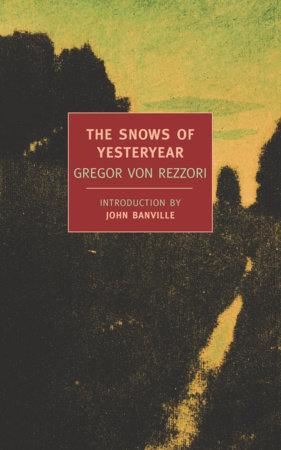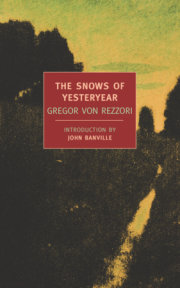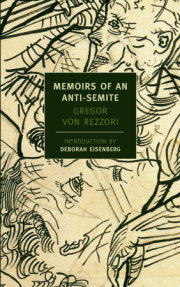"One of those rare and lovely books that defy category. Fiction and non-fiction meet in the precision and quality of Rezzori's prose, in his passion for the perfect detail, and in his power to capture the reader's heart."-Alan Furst
“Von Rezzori's best-known novel, Memoirs of an Anti-Semite, and his recent memoir, The Snows of Yesteryear, were works of sly, silky lyricism filled with sharp detail and a deft, ironic moral weight. Above all they offered marvelous character-portraits in prose, with the novel wryly evoking the women who shaped its narrator's sensual and intellectual life and the memoir giving an indelible account of von Rezzori's tragicomically dysfunctional family as it weathered the cataclysms of a war-stricken Europe.” –Washington Post
The Snows of Yesteryear “leads into a world now irretrievably lost, its values blown away by World War I and its fortures wrecked by the inflationary ‘20s…Strong material, then; and Rezorri follows this family back with a fine disdain for sentiment, a transparency of feeling, an acid sense of humor and a vigilant eye for nuances of love and indifference, language, landscape and class behavior. It is not a young man’s (or a moralist’s) book. But it is intensely moving and contains, in its winding and ironic cadences, not a slack sentence.” –Time magazine
“Writing in lyrical, allusive prose–elegantly translated from the German by H. F. Broch de Rothermann–Mr. von Rezzori uses his portraits…to create a book that is, at once, an autobiography and a picture of a vanished age…The Snows of Yesteryear reveals its author’s rich pictorial imagination, his seemingly total recall, his gift for revealing character through anecdotes colored by memory…His book remains both an elegiac tribute to a receding past and a testament to the redemptive powers of memory–a family photography album, beautifully translated into words.” –Michiko Kakutani, The New York Times
“The Snows of Yesteryear is a classic which bears comparison in its artistic integrity with Nabakov’s Speak, Memory and Sarte’s Les Mots.” –The Independent (London)
“The Snows of Yesteryear is autobiography as portraiture…Each portrait is a miniature of the Bukovinian past.” –The New York Review of Books
“If any individual life could encapsulate the geographic and psychic dislocation that has been the central experience of the 20th century, that life might be Gregor von Rezzori’s…Rezzori has explored the consequences of this century’s disruptions in a series of remarkable books…The Death of My Brother Abel, Memoirs of an Anti-Semite, and The Snows of Yesteryear.” –Newsday
“[Memoirs of an Anti-Semite and The Snows of Yesteryear are] works sly, silky lyricism filled with sharp detail and a deft, ironic moral weight. Above all they offered marvelous character-portraits in prose.” –The Washington Post
“The Snows of Yesteryear’s five ‘portraits’ add up to a nonfiction Bildungsroman…an eclectic cultural smorgasbord almost comical in its complications…Shrewdly dovetailing psychological observation and factual background in five marvelous interdependent narratives, Rezzori blends public and personal history with brilliance and aplomb. Praise should go to translator H. F. Broch de Rothermann for rendering Rezzori’s German into such seductively lyrical English prose.” –The Seattle Times
“The weight of history lies heavily on the people of Central Europe; this powerful memoir shows us how painful that weight can be.” –Newsday
"Dazzling prose, humane insights and good humor…[Rezzori] has created, not simply recorded a memoir of growing up in the linguistic and political no-man's-land of interbellum central Europe." –Boston Globe
“The iconoclastic author of Memoirs of an Anti-Semite and The Death of My Brother Abel mulls over his childhood. Like Elias Canetti, a modern Homer of Central European aristocracy, Rezzori frames the past like a classicist, feels it like a tormented youth.” –Philadelphia Inquirer
“The Snows of Yesteryear is a classic which bears comparison in its artistic integrity with Nabokov's Speak, Memory and Sartre's Les Mots.” –The Independent (London)
Intensely moving...with a fine disdain for sentiment, a transparency of feeling, an acid sense of humor and a vigilant eye for nuances of love and indifference, language, landscape, and class behavior.
— Robert Hughes, Time








